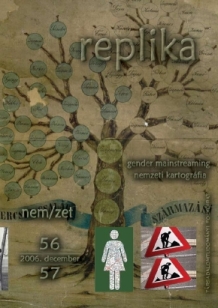Egyenlő bánásmód vagy gender mainstreaming? A nemek közötti egyenlőség politikája Magyarországon
Gender Equality Policy or Gender Mainstreaming: the Case of Hungary
Author(s): Andrea Krizsán, Violetta ZentaiSubject(s): Gender Studies
Published by: Replika Alapítvány
Keywords: gender mainstreaming; policy; EU; harmonisation; framing; equality; accession
Summary/Abstract: The aim of this paper is to illustrate some of the conceptual and implementation issues around the gender mainstreaming strategy as those are reflected in the Hungarian case. It analyses the Hungarian policy context in terms of the presence of the gender mainstreaming approach, and in terms of the political framing of some crucial aspects of gender equality. Our argument in this paper is twofold. First, we argue that the concept of gender mainstreaming as a cross-sectoral and comprehensive policy tool towards gender equality has been sporadically present and mostly only at the rhetorical level in Hungary. The country has no comprehensive gender equality strategy and no strong distinctive gender equality mechanism currently in place. Instead, the promotion of equal opportunity on all grounds became a powerful policy approach in the last two or three years, often neglecting the specific requirements of gender equality. Second, we argue that the influence of the European Union accession process has had two stages, as far as gender equality policy is concerned in Hungary. The first stage meant primarily the de jure harmonisation of Hungarian legislation with relevant EU directives, but has brought very little harmonisation at the policy level, and limited de facto realisation of the rights imposed by the directives. The second stage, the beginning of which can be located somewhere around mid 2003, meant Hungary’s joining of the different EU level policy processes. This stage signalled a shift from legislative harmonisation to a more policy focused approach. This stage seems to have brought a more direct import of EU policy concepts and tools, such as gender mainstreaming. It is too early to judge however the practical implications of this stage.
Journal: Replika - Társadalomtudományi folyóirat
- Issue Year: 2006
- Issue No: 56-57
- Page Range: 181-201
- Page Count: 21
- Language: Hungarian

